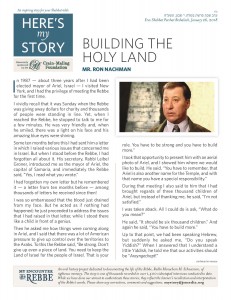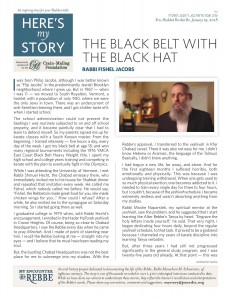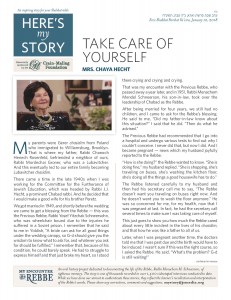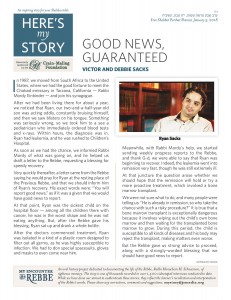Building the Holy Land
In 1987 – about three years after I had been elected mayor of Ariel, Israel – I visited New York, and I had the privilege of meeting the Rebbe for the first time.
I vividly recall that it was Sunday when the Rebbe was giving away dollars for charity and thousands of people were standing in line. Yet, when I reached the Rebbe, he stopped to talk to me for a few minutes. He was very friendly and, when he smiled, there was a light on his face and his amazing blue eyes were shining.
Some ten months before this I had sent him a letter in which I raised various issues that concerned me in Israel. But when I stood before the Rebbe, I had forgotten all about it. His secretary, Rabbi Leibel Groner, introduced me as the mayor of Ariel, the capital of Samaria, and immediately the Rebbe said, “Yes, I read what you wrote.”
I had forgotten my own letter but he remembered it – a letter from ten months before – among thousands of letters he received since then!
I was so embarrassed that the blood just drained from my face. But he acted as if nothing had happened; he just proceeded to address the issues that I had raised in that letter, while I stood there like a child in front of a genius.
Then he asked me how things were coming along in Ariel, and I said that there was a lot of American pressure to give up control over the territories to the Arabs. To this the Rebbe said, “Be strong. Don’t give up even a piece of land. You need to keep the Land of Israel for the people of Israel. That is your role. You have to be strong and you have to build more.”
I took that opportunity to present him with an aerial photo of Ariel, and I showed him where we would like to build. He said, “You have to remember, that Ariel is also another name for the Temple, and with that name you have a special responsibility.”
During that meeting I also said to him that I had brought regards of three thousand children of Ariel, but instead of thanking me, he said, “I’m not satisfied.”
I was taken aback. All I could do is ask, “What do you mean?”
He said, “It should be six thousand children.” And again he said, “You have to build more.”
Up to that point, we had been speaking Hebrew, but suddenly he asked me, “Do you speak Yiddish?” When I answered that I understand a little Yiddish, he told me that our activities should be “Arayngechapt!”
I didn’t know what he meant so Rabbi Groner chimed in to explain that arayngechapt means “catch it all.” (more…)









